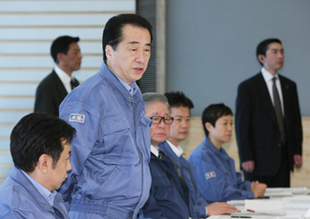
TOKYO (BP)–The danger of radiation from damaged nuclear reactors has greatly complicated Southern Baptist disaster relief efforts in Japan, one member of the assessment team reported March 15.
A third explosion at a nuclear plant March 15 exposed fuel rods for several hours, sending radiation levels soaring to 163 times previous levels, the United Nations reported. The government responded by ordering people living within 19 miles of the nuclear complex to stay indoors to avoid exposure.
“The crisis at the nuclear power plant further complicates the situation,” said one member of the Baptist Global Response disaster relief assessment team who arrived in Tokyo March 12. “Presently our ability to respond to the tsunami is minimal because access to the coastal areas is severely curtailed as the government responds to the crises in the area. We are concentrating our assessment on non-coastal areas where damage was caused by the earthquake.”
The Japan disaster relief situation is unlike any other in recent history, noted Pat Melancon, BGR’s disaster management specialist.
“When most disasters occur, a single event is normally accompanied by a fairly set list of accompanying effects. Floods will leave mud, destroy crops, damage homes, contaminate water supplies and cause sicknesses,” Melancon said. “When earthquakes occur, you see some of the same results, with additional problems like interrupted transportation, widespread structural damage or destruction and the like.
“The Japan event, however, is different. Here we have three catastrophic events: the earthquake, which did much damage in areas not being featured in the news; the tsunami, which hit the low coastal areas of Japan especially hard; and now an additional unfolding event — the demise of nuclear power plants.”
In a complex humanitarian crisis, different events affect the total situation in such a way that a response to one event must be considered in context with the others, Melancon noted.
“Each situation affects the others. The response becomes very complex,” Melancon said. “You have to identify the most current critical factor in the response that will diminish the severity of the combined events and begin with that response. Eventually all the issues will be addressed.
“This event is unlike any other in recent history,” Melancon said. “BGR will respond methodically, with the aid of Southern Baptists and other Christians from around the world. To do this effectively, we need your prayers and support.”
“We all grieve about the images we are seeing on television,” said Jeff Palmer, executive director of Baptist Global Response. “Our inclination is to jump on a plane and go. When we have a disaster response, we usually tell people they can help by praying, giving and going. Right now, the best way they can help is by praying, giving and waiting.
“This will be a very long-term response,” Palmer said. “We need to let our experts, trained people and Japanese partners lead us in our efforts.”
–30–
Mark Kelly is senior writer for Baptist Press. Baptist Global Response is located on the Internet at www.gobgr.org. The International Mission Board has established a relief fund for the Japan earthquake. Donations may be sent to: Office of Finance, International Mission Board, 3806 Monument Ave., Richmond, Va. 23230. In the memo line write “Japan Response Fund.” Or visit http://imbresources.org/index.cfm/product/detail/prodID/3352 to give online. For further information call the IMB toll-free at 1-800-999-3113.

















